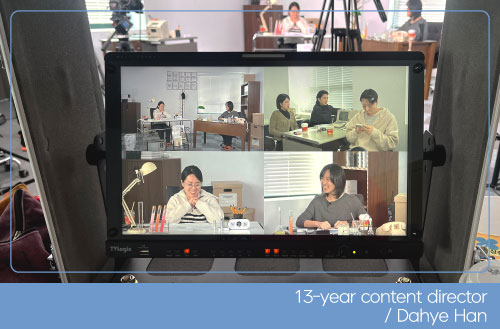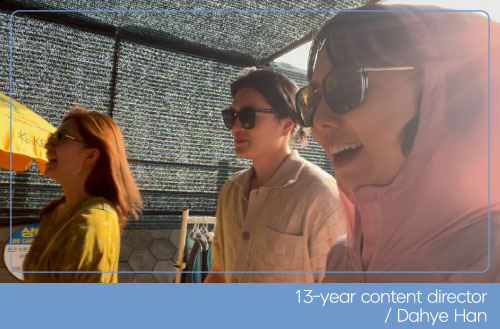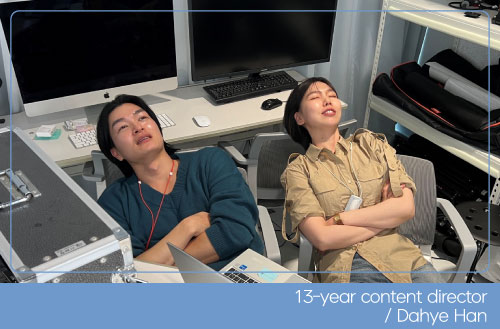

-
-
- 메일 공유
-
https://stories.amorepacific.com/en/amorepacific-between-work-and-emotion-on-wanting-to-remain-a-planner-for-the-long-haul
Between Work and Emotion: On Wanting to Remain a Planner for the Long Haul
Forties: How to Work Longer and More Beautifully #2: Keeping the Love Alive

Columnist
Da-hye Han Makeup Professionals Team

Through the lens of my forty-year-old self, who wants to continue working authentically, I share the profound and new beauty discovered through years of steady dedication in one field, across five columns.
#INTRO
“What do I even like these days?”
I used to be someone who always knew what I loved, but at some point, that answer became elusive. Opening and closing countless tabs throughout the day, jumping between ideas and data, I forget what I used to love. My senses grow dull, my heart grows busy.
What I’ve learned as a planner is that inspiration doesn’t come suddenly. To truly see what you love, you must protect that feeling of love for yourself. I’ve developed certain practices to preserve these emotions—personal methods to prevent myself from wearing thin between work and feelings.
This is a record of those practices.
And a story about how hard I’m still trying to continue doing what I love.
1 Ideas Don’t “Come to You”—They Begin with Retracing
I believe inspiration is closer to “retracing” than “coming to you.” What draws my heart these days, where I’ve lingered longest, which images made me stop scrolling? In these moments of revisiting emotional directions, the threads of ideas often unravel.
To not miss these emotional directions, to not let those subtle tremors pass by unnoticed, I move with intention. I seek out interviews with directors I admire, read poems by beloved poets aloud, sit in the corner of lecture halls for aesthetics courses, and browse through old art directors’ essays and photographers’ collections at art libraries.

These days, I’m immersed in “The Director’s Eye” and “Cinematographic Aesthetics.” Books I bought last week and things I’ve recently learned.
The photographs contained their sensibilities with such clarity. It wasn’t a matter of technique, but of perspective; not skill, but attitude. Someone who doesn’t replicate emotions but follows their flow and sees it in their own way. Someone whose gaze responds before words do. I want to linger in this attitude. And someday, I want to become someone who can convey what I feel through a single image.
So even now, when I need ideas, I first look within myself. Where have I lingered lately, what have I been revisiting repeatedly, what emotions remain inside me? I believe only ideas born from such emotions can ultimately reach others as emotions, too.
2 The Feeling of Love Erodes Quietly and Often
The busier work became, the duller my senses grew. “We need to increase conversion rates.” “Make it sell better.” These weren’t wrong, but at some point, they no longer contained any clues about why I started this work or what I loved about it. While I was faithfully performing my role as a planner, my love for this work was gradually fading. So I deliberately tried to stop working and create distance from myself. I desperately needed time that had nothing to do with work.
A few years ago, during my busiest period, I attended a woodworking shop every weekend. When I immersed myself in completely unrelated materials and tools, in the repetitive rhythm of hands, I could temporarily separate from “myself as a planner.”
Before class began, there was a small ritual called the “one-minute speech.” Talking about the past week in one minute. “After the shoot, I had tempura donburi at a restaurant I can’t go to on weekdays.” “I stayed up late the night before the shoot, choosing a playlist of music the model would like.” Even daily life that seemed uneventful always had sparkling moments when spoken aloud. After that time passed, I’d begin sanding wood with my hands. Sanding is a simple repetitive motion, but strangely, within that quiet rhythm, my mind would clear, and tangled threads of ideas would unravel. I thought I’d run out of mental fuel, but as I moved my hands along the wood grain, the spark would reignite.
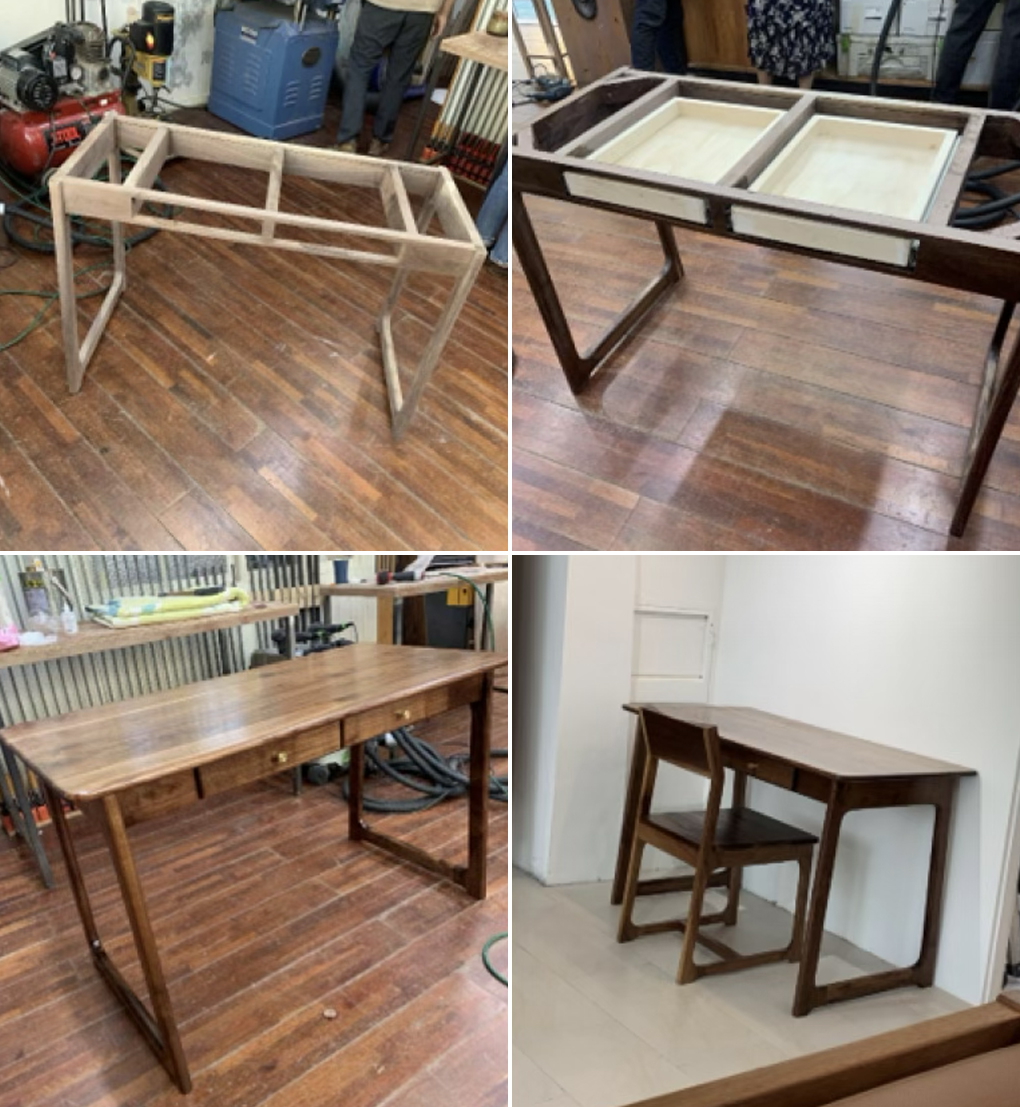
A desk I made at the woodworking shop, cutting and shaping the wood myself
After that experience, I learned that time spent deeply immersed in something other than work restores my sense of work. Not time spent consuming pretty things, but time quietly examining what I genuinely like. Only with that time could I recognize myself again and finally recall precisely who I am.
I’m someone who prefers directors’ interviews to their films, who likes poets more than their finished poems, who enjoys writing lyrics more than listening to songs. I’m drawn to interpretation over appreciation, more interested in a person’s structure and grain than their surface impressions. Rather than the outcomes, it’s the flow, the reasons leading to them, their rhythm, and temperature that move me. I linger longer on how emotions are created than on the completed emotions themselves.
These sharp, quiet preferences ultimately became the roots of the sensibility I need as a planner. Though these tastes initially seemed too personal and inefficient, they became clearer over time. I prefer sentences that linger and require contemplation over words that reach someone easily, and I trust scenes remembered belatedly more than instant spectacle. These are what I ultimately want to create.
I’ve learned that to love something for a long time, you must know how to protect that feeling of love. Deep, narrow emotions don’t wear out easily, are remembered longer, and eventually lead back to work.
This was the practice I’ve maintained to find balance between work and myself, and that practice continues to this day.
3 Emotions Linger Long and Eventually Become My Work
For a while, I attended poetry reading gatherings for a long time. Although the gathering was informal, people with deep emotions still participated nonetheless. They were evenings of quietly liking each other, being shy, and offering our hearts. We’d each choose favorite poems to read in turn, share memorable lines, and there were moments when emotions connected without words.
One scene remains unforgettable. One day, a participant quietly pulled out a piece of paper. “I wrote a poem.” The air in that moment when they said they’d read their poem was incredibly delicate yet warm. Their voice trembled slightly, but the sentences contained a strangely precise heart. Before the poem ended, I heard sniffling from various corners, and I sat there unable to speak for a long while. That scene was the kind of emotion I wanted to remember forever. It was the moment I saw with my own eyes that sincerity ultimately reaches others.
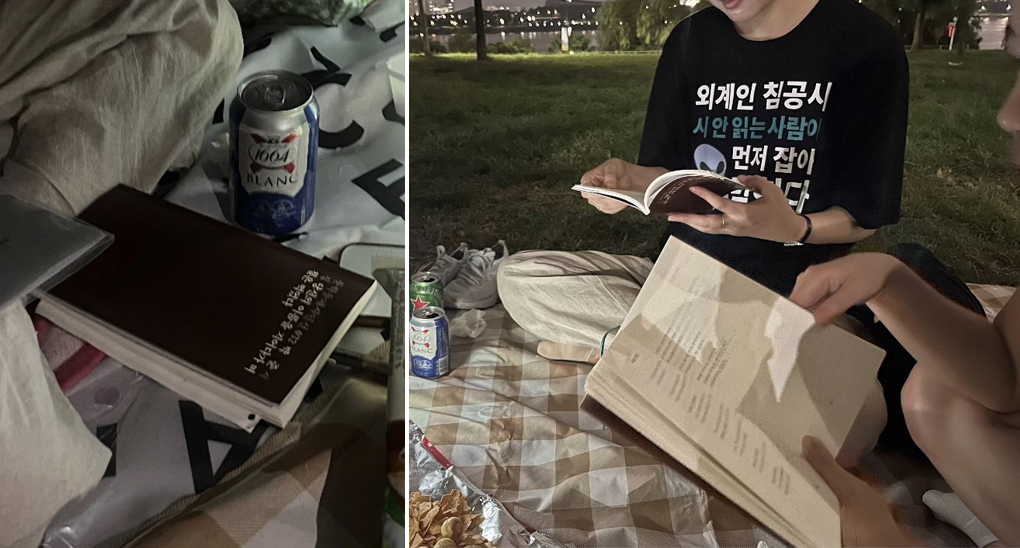
An evening quietly sharing poetry by the Han River with people who love poetry
Since then, whenever I begin a new project, I quietly ask myself:
“What has moved me lately?”
That question becomes my direction.
There must be emotion before ideas. I’ve learned that only those who protect their feelings of love can truly love for a long time and ultimately move others.
Hence, I still collect small, quiet emotions. When I have time after work, I attend lectures by critics I admire, deliberately visit distant bookstores to buy books, and play music by composers recommended by writers I like at night. Though it appears I’m doing nothing on the surface, something moves slowly within me during that time. The grain of emotions shifts, sentences emerge, and feelings I couldn’t reasonably handle somewhere become words.
These ultimately become the roots of my next work. Even now, I replay content I’ve created multiple times: the funny scenes, the awkward cuts, the moments when emotional flow connected precisely. I don’t just look at the finished product, but revisit what I made with love. The feeling that the world I created is still alive. I need that affection to find strength for the next work.
I hope I won’t be replaced. I know better than anyone that junior colleagues with good instincts are scarier than AI. But the feeling of love is mine alone. It can’t be imitated or built in a short time.
To not lose sight of emotion’s essence, to not lose the roots of my sensibility, I’m quietly becoming a bit stronger today.
And tomorrow too, I’ll live to continue loving what I love.
-
Like
2 -
Recommend
0 -
Thumbs up
0 -
Supporting
0 -
Want follow-up article
0



